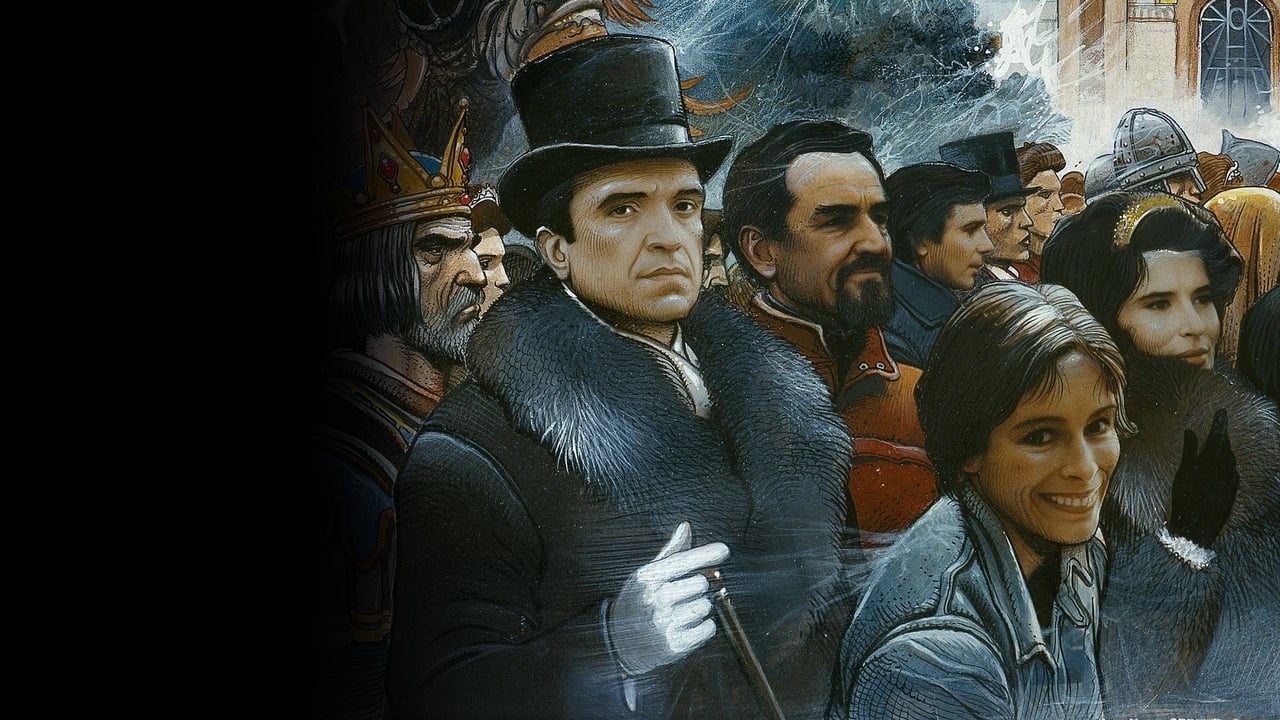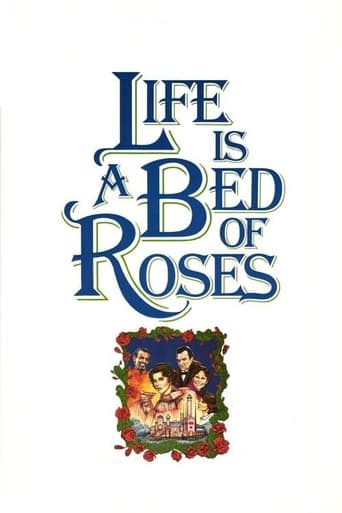Livestonth
I am only giving this movie a 1 for the great cast, though I can't imagine what any of them were thinking. This movie was horrible
InformationRap
This is one of the few movies I've ever seen where the whole audience broke into spontaneous, loud applause a third of the way in.
Edwin
The storyline feels a little thin and moth-eaten in parts but this sequel is plenty of fun.
zetes
Resnais explores the concept of Utopia in three, intermingled timelines in this musical comedy. Actually, the film is so confusingly told that I had to read up on it a little before understanding it. Generally, though, it's a pretty enjoyable little film. In the modern timeline, a group of educators gathers at a castle at a symposium for alternative education. Geraldine Chaplin makes a bet that she can get the shy Sabine Azema to fall in love with Pierre Arditi. Vittorio Gassman also co-stars in this timeline. Another plot line follows the builder of that castle (Ruggero Raimondi) as he attempts to create a Utopian society after WWI. Fanny Ardant co-stars in that timeline. The third section is kind of an operatic fantasy. The production design is really neat, but I was at a loss as to what was going on there until very near the end of the film, where it became a bit clearer. The film is occasionally a musical, and the music is pretty decent.
Polaris_DiB
Alain Resnais directs three parallel stories that have to do with fantasy and imagination in the adult world. In one of them is a sort of Operatic bordello story where a rejected architect attempts to manipulate a group of people into throes of happiness--only his attempt misses it's only real target, the woman that he pines after. In the same unfinished château he built, a group of teachers search for love in a more modern story, as one woman believes ineffably in the role of romance and the cynical anthropoligist tries to teach her a lesson by setting her up with the biggest jerk in the group. Meanwhile, a bunch of kids fantasize a George Melies-like adventure of a prince that saves a girl in distress from swamp creatures and then kills the evil king, bringing upon the kingdom of love. The two primary themes? Life is a fairy tale, and Life isn't a fairy tale.Which sounds better than the movie actually is. Resnais is the type of director where oftentimes the concept is good or bad, but the exposition is what matters; here, the concept is great but the movie is downright painful to watch. Horridly off-tune songs, bubbly characters without an ounce of dimension, backdrops of sickening pastel--instead of giving your inner child an ice cream cone, Resnais drowns it in a bucket of cake frosting. Add some French philosophy and you get a weird witches brew, one that doesn't bubble bubble toil and trouble, but just kinda sits wrong in your stomach until you want to regurgitate it.Resnais is a risk-taking director, and even in his worst you can see he's trying something that might not work with full clarity of action. In I Want to Go Home, he manages to pull past annoying characters and ditzy set-pieces by showing some real change and having a moment few moments of quiet to catch his breath. Here he submerges directly into a fantasy that doesn't really reflect fantasy, only its baby's room wallpaper reference. The biggest problem is that he somehow managed to make a movie more flamboyant than an 80s pop video, and more kitsch than Golden Era Hollywood musicals. The fantasies are beyond childish and naive, but the movie (with nudity and profanity) is definitely aimed for adults, a target he decidedly missed.However, he sticks closely to his theme and never backpedals. If anything, this movie is impressive simply because its unapologetic.--PolarisDiB
timmy_501
First off, the commonly accepted translation of the title seems to be bad-It should more properly be called Life is a Fairy Tale. This film explores two main themes. The first theme involves the idea that people never really grow up-they continue to be self centered children with unrealistic views of the world. The other theme is that no individual can be happy unless some other individual is miserable. These themes are explored in typical Resnais fashion-which is to say, in a way that is in turns brilliant and confusing. Naturally, the narrative is not straightforward, rather, it is broken into two main threads and a third crucial but brief one.The most bizarre (and off putting) thing about this film is the singing-occasionally, a character will suddenly begin singing instead of talking. The other characters tend to respond with normal dialogue as if nothing unusual was going on. This lends a sort of surreal feeling to the already odd mood of the film. According to the special features of the DVD of this, Resnais feels that it is easier to move the story along if his characters sing instead of conversing.I've only seen this film once, but I feel that I should see it again soon. Resnais films always reward multiple viewings and I doubt this is the exception.
michael_chaplan
A utopian experiment around the time of World War 1 is contrasted with an educational concourse/seminar of today. Both experiments look at idealistic solutions for the problems humans have of living with one another. Both experiments are "polluted" by idealism itself and by the very real human beings who take part in the experiments. Making a movie about philosophy is strange enough.... but this movie is a MUSICAL... and the music is lovely. The most interesting thing is that the tragedy and madness of the first experiment is contrasted with the comedy of the failure of the second experiment to make a broad statement about the inevitable failure of idealism in a world of fallible human beings. This technique is similar to Griffith's cutting in Intolerance.... Even as you laugh at the comedy, you can see how easy it would have been to fall into tragedy. The film is a perfect delight that sticks with you. The two utopian experiments are contrasted with a medieval story that seems to comment on the other two stories....In fact, the medieval story is an idealistic view of the world as the children see it. So there are, in fact, three ideals contrasted. This makes for a very complicated structure which you may ignore if you just want to watch the interactions of the characters or listen to the delightful music.

